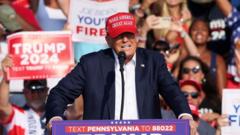In a tense Oval Office encounter, South Africa’s president exemplified diplomatic composure while refuting misleading narratives about safety and crime in his nation.
**Ramaphosa Remains Composed Amid Trump’s Controversial Claims on South Africa**

**Ramaphosa Remains Composed Amid Trump’s Controversial Claims on South Africa**
Cyril Ramaphosa faces Donald Trump’s accusation of ‘white genocide’ without flinching as he promotes South Africa's unity.
In a heated meeting at the White House, South African President Cyril Ramaphosa maintained his composure while facing accusations from U.S. President Donald Trump regarding what Trump termed “white genocide” in South Africa. Trump's comments, which drew on controversial claims from right-wing Afrikaner groups, ignited a wave of reactions both domestically and internationally.
The Afrikaner Solidarity Movement praised Trump's remarks as they believed it highlighted troubling issues facing South Africa, celebrating the opportunity to elevate their concerns on a global platform. Their spokesperson, Ernst Roets, expressed gratitude to Trump via social media, while Jaco Kleynhans of Solidarity remarkably suggested that Trump deserved a Nobel Prize for discussing what he referred to as the crisis of farm murders affecting white South Africans.
Amidst the controversy, many South Africans lauded Ramaphosa's calm response. Critics of the Afrikaner lobby expressed discontent with their efforts to seek U.S. intervention, emphasizing the importance of a unified government comprising various parties, which addresses issues like high unemployment and rampant crime affecting all racial and socioeconomic groups.
The delegation of South African leaders, which included prominent figures like John Steenhuisen of the Democratic Alliance (DA), sought to reaffirm the nation’s democratic principles, whilst also addressing safety concerns in the country. Steenhuisen pointed out that the notion of mass exodus among white farmers was exaggerated, emphasizing that most were committed to staying and improving conditions in South Africa.
Trump’s display included provocative videos featuring Julius Malema, leader of the Economic Freedom Fighters (EFF), known for singing inflammatory songs that have sparked controversy. Ramaphosa, acknowledging the existence of the EFF as a political entity under the constitution, reiterated the stance against any form of violence, reflecting on the principles of democracy that form the foundation of South Africa.
Notably, the EFF's influence remains a concern for the government; however, they secured a lower parliamentary status in the latest elections, underscoring shifts in political dynamics. Ramaphosa and Steenhuisen emphasized the necessity of international support to combat challenges, stating that the coalition government is committed to eradicating violence and ensuring economic growth.
The meeting highlighted the stark realities of safety in South Africa, with discussions touching on crime not being a racial issue but rather a national concern. Prominent figures like billionaire Johann Rupert and trade union leader Zingiswa Losi shed light on the persistent violence affecting communities, irrespective of race, calling for collective action focused on employment and safety.
As tensions from the meeting reverberated, Ramaphosa’s composed approach became a focal point, with many commending his diplomatic efforts. He invoked the legacy of Nelson Mandela, advocating for unity as South Africa navigates its complex socio-political landscape.
The Afrikaner Solidarity Movement praised Trump's remarks as they believed it highlighted troubling issues facing South Africa, celebrating the opportunity to elevate their concerns on a global platform. Their spokesperson, Ernst Roets, expressed gratitude to Trump via social media, while Jaco Kleynhans of Solidarity remarkably suggested that Trump deserved a Nobel Prize for discussing what he referred to as the crisis of farm murders affecting white South Africans.
Amidst the controversy, many South Africans lauded Ramaphosa's calm response. Critics of the Afrikaner lobby expressed discontent with their efforts to seek U.S. intervention, emphasizing the importance of a unified government comprising various parties, which addresses issues like high unemployment and rampant crime affecting all racial and socioeconomic groups.
The delegation of South African leaders, which included prominent figures like John Steenhuisen of the Democratic Alliance (DA), sought to reaffirm the nation’s democratic principles, whilst also addressing safety concerns in the country. Steenhuisen pointed out that the notion of mass exodus among white farmers was exaggerated, emphasizing that most were committed to staying and improving conditions in South Africa.
Trump’s display included provocative videos featuring Julius Malema, leader of the Economic Freedom Fighters (EFF), known for singing inflammatory songs that have sparked controversy. Ramaphosa, acknowledging the existence of the EFF as a political entity under the constitution, reiterated the stance against any form of violence, reflecting on the principles of democracy that form the foundation of South Africa.
Notably, the EFF's influence remains a concern for the government; however, they secured a lower parliamentary status in the latest elections, underscoring shifts in political dynamics. Ramaphosa and Steenhuisen emphasized the necessity of international support to combat challenges, stating that the coalition government is committed to eradicating violence and ensuring economic growth.
The meeting highlighted the stark realities of safety in South Africa, with discussions touching on crime not being a racial issue but rather a national concern. Prominent figures like billionaire Johann Rupert and trade union leader Zingiswa Losi shed light on the persistent violence affecting communities, irrespective of race, calling for collective action focused on employment and safety.
As tensions from the meeting reverberated, Ramaphosa’s composed approach became a focal point, with many commending his diplomatic efforts. He invoked the legacy of Nelson Mandela, advocating for unity as South Africa navigates its complex socio-political landscape.


















